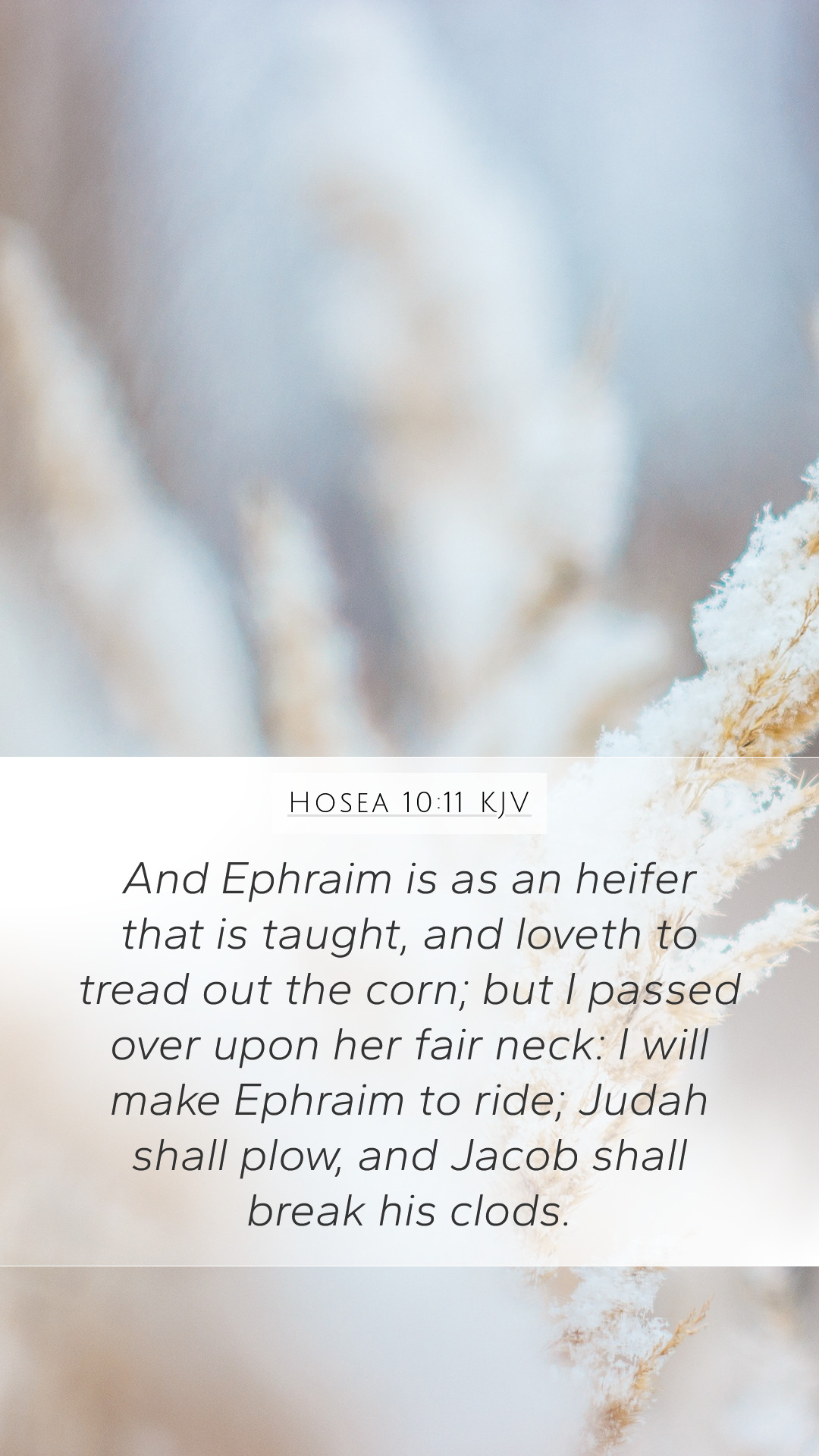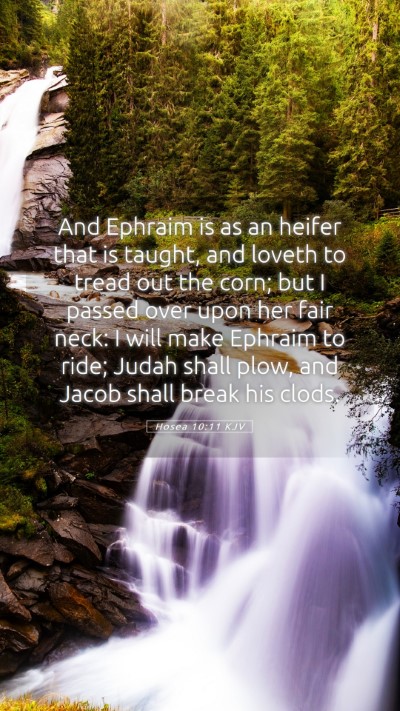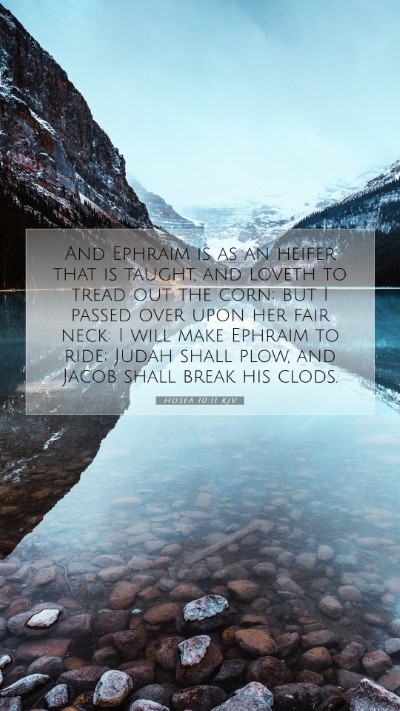Old Testament
Genesis Exodus Leviticus Numbers Deuteronomy Joshua Judges Ruth 1 Samuel 2 Samuel 1 Kings 2 Kings 1 Chronicles 2 Chronicles Ezra Nehemiah Esther Job Psalms Proverbs Ecclesiastes Song of Solomon Isaiah Jeremiah Lamentations Ezekiel Daniel Hosea Joel Amos Obadiah Jonah Micah Nahum Habakkuk Zephaniah Haggai Zechariah MalachiHosea 10:11 Meaning
What is the meaning of Hosea 10:11?
And Ephraim is as an heifer that is taught, and loveth to tread out the corn; but I passed over upon her fair neck: I will make Ephraim to ride; Judah shall plow, and Jacob shall break his clods.
Hosea 10:11 Bible Verse Meaning
Understanding Hosea 10:11
Hosea 10:11 presents a vivid image of Israel's relationship with God, illustrating themes of judgment, responsibility, and the consequences of disobedience. The verse states:
"And Ephraim is as an heifer that is taught, and loveth to tread out the corn; but I passed over upon her fair neck: I will make Ephraim to ride; Judah shall plow, and Jacob shall break his clods."
Bible Verse Meaning
This passage can be seen as an allegorical representation of Israel's current state. The use of agricultural imagery symbolizes prosperity, yet also serves to underscore Israel's failures and the impending judgment.
Verse Analysis
- Ephraim as a Heifer: Matthew Henry notes that Ephraim, representing the northern kingdom of Israel, is compared to a heifer, an animal used for labor on a farm, signifying a time of ease and abundance. This is juxtaposed with the reality of their spiritual ineptitude and lack of awareness regarding their pending judgment.
- Judgment and Responsibility: Albert Barnes describes how Ephraim's desire to enjoy life ('loveth to tread out the corn') reflects self-indulgence. God’s action of 'passing over' her neck indicates taking control, implying that God would soon discipline Ephraim, redirecting her focus from earthly pleasures to the necessary work of repentance.
- Divine Discipline: Adam Clarke emphasizes that God’s intention to 'make Ephraim to ride' carries the notion that discipline will result in refinement. The image of Judah plowing and Jacob breaking clods indicates the involvement of the southern kingdom in God’s agricultural imagery, suggesting cooperation or a response to divine guidance.
Understanding Scripture within its Context
Hosea's overall message revolves around God's relentless pursuit of a wayward Israel. This verse illustrates the tension between divine grace and human failure. The imagery of farming not only resonates with the agricultural context of the time but also draws on the notion of laboring for a bountiful return, which in this case has turned into a warning of impending judgment and the call for repentance.
Key Themes in Hosea 10:11
- God's Sovereignty: The metaphor of Ephraim as an obedient heifer that behaves as she desires before being constrained by God signifies divine authority.
- Repentance and Transformation: The transition from free-spirited consumption to being reined in foreshadows the need for Israel (or Ephraim) to repent and change their course toward God.
- Interconnectedness of Israel and Judah: The reference to Judah’s role in plowing points to the unity in their covenant relationship, highlighting the shared responsibility for faithfulness to God.
Bible Verse Explanations and Applications
Understanding Hosea 10:11 affords us deeper insights into applying biblical themes in our lives today:
- Responsibility in Faith: Just as Ephraim's desires led to wanderings, we too must be cautious not to allow our pursuits to replace our commitment to God.
- Embracing Discipline: The necessity of divine discipline suggests that challenges in our lives may be God's way of redirecting our paths toward a more fruitful relationship with Him.
- Unity in Purpose: Recognizing our roles in God's plan calls for teamwork within the body of believers to assign tasks that glorify God.
Cross References
- Isaiah 1:3 - "The ox knoweth his owner, and the ass his master's crib: but Israel doth not know, my people doth not consider."
- Jeremiah 4:3 - "For thus saith the Lord to the men of Judah and Jerusalem, Break up your fallow ground, and sow not among thorns."
- Hosea 12:10 - "I have also spoken by the prophets, and I have multiplied visions, and used similitudes, by the ministry of the prophets."
Conclusion
The careful analysis of Hosea 10:11 elucidates the inevitable need for repenting from self-indulgence and returning to a place of humble obedience under God's guidance. Through historical context and vibrant imagery, we are reminded of God’s authority, grace, and the transformative power of divine discipline.


